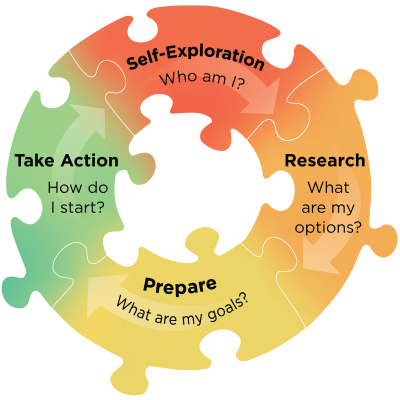A career is your journey through life, learning, work and it is made up of many different pieces.
At Carleton, we refer to career development as assembling a puzzle. Puzzle pieces serve as a visual guide for understanding the steps in your career journey.
You may find yourself moving through this career cycle in either direction, sometimes returning to an earlier step in the cycle. The career development process is a lifelong journey that involves preparing and refining your career goals over time.
The earlier you begin to focus on your career development, the better prepared you will be to assemble the pieces and decide which path, or career, you will choose.
Figuring out your career path is not always a linear process because individual’s needs differ based on their experiences, knowledge and openness to explore. It is a continuous and dynamic process. It is helpful to remember that you are likely to have a number of careers in your lifetime. Your first job after graduation will probably not be your forever job — it may just be the next piece of the puzzle!

Self-Exploration
Who am I?
It is important to have a sound understanding of yourself in preparation for career planning.
Gaining this deeper understanding of your values, interests, strengths, preferences, skills and abilities is a key piece in the puzzle and will allow for a better fit when researching career opportunities or choosing a degree program.
The exploration phase is all about understanding yourself and figuring out what degree program and career path aligns best with your interests and values. Before applying to numerous jobs or further education programs, consider assessing the following personal attributes to gain more clarity regarding the directions you want to consider:
- Skills
- Competencies
- Values
- Interests
- Personality preferences
Action Steps
- Reflect on your past and current experience to identify common themes
- Ask yourself:
- What subjects interest me?
- What motivates me?
- What skills do I have and what skills do I want to gain?
- Learn about your personality type through online assessments and meet with a Career Counsellor who can interpret the results with you
Research
What are my options?
Now that you have a clear understanding of your values, skills, and interests, you can move on to the next piece: researching your options and opportunities.
Find out about different career paths and possibilities that interest you by researching online, through people, and trying different experiences.
Action Steps
- Review web resources for more details on careers of interest
- Research if your career of interest requires additional training or education
- Connect with professionals in your field of interest and conduct Information Interviews in order to gain more insight into the field and access the Hidden Job Market
- Use social media to connect to organizations, learn about career paths and network with professionals
- Attend career events, such as Career Fairs and networking events to meet with and learn from industry experts
- Look for experiential learning opportunities, such as co-op, internships, and volunteering, to get hands on knowledge of potential career options
Prepare
What are my goals?
In your research, you will identify the next steps necessary to get you where you want to go. This step will allow you to narrow down your research to targeted goals.
Action Steps
- Decide on your SMART GOALS to help you move towards your career objectives. Be flexible and think of possible alternatives in case things do not go according to plan.
- Maintain your connections in your professional network and use your network to pinpoint opportunities to gain experience in your field.
Take Action
How do I start?
This step is action-oriented!
Move forward with your goals and execute your well-thought-out plan.
Action steps in this stage might be:
- Apply to grad school
- Re-connect with individuals you spoke with during your research stage regarding possible job openings
- Gain additional training or qualifications needed for potential career paths
- Develop your resume or CV
